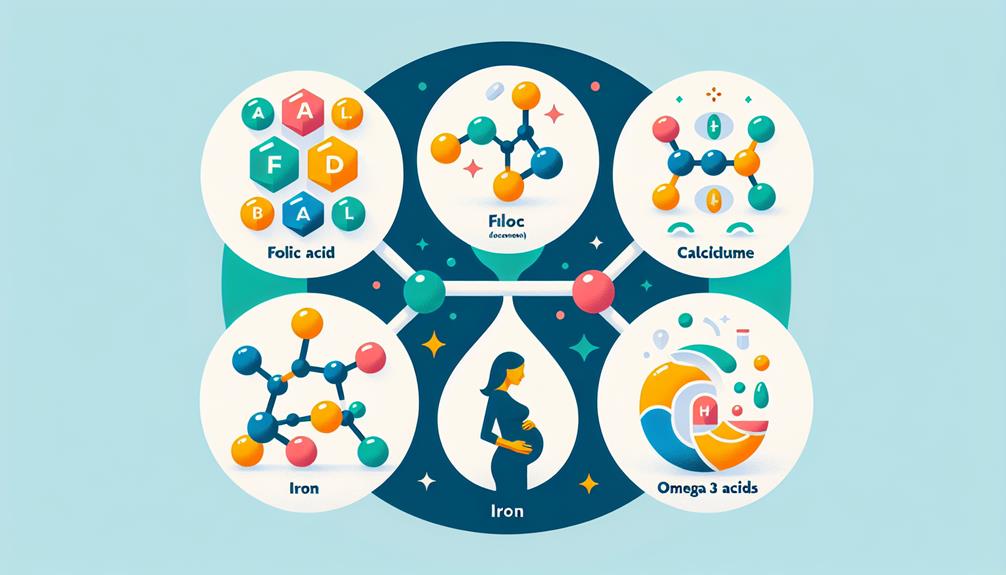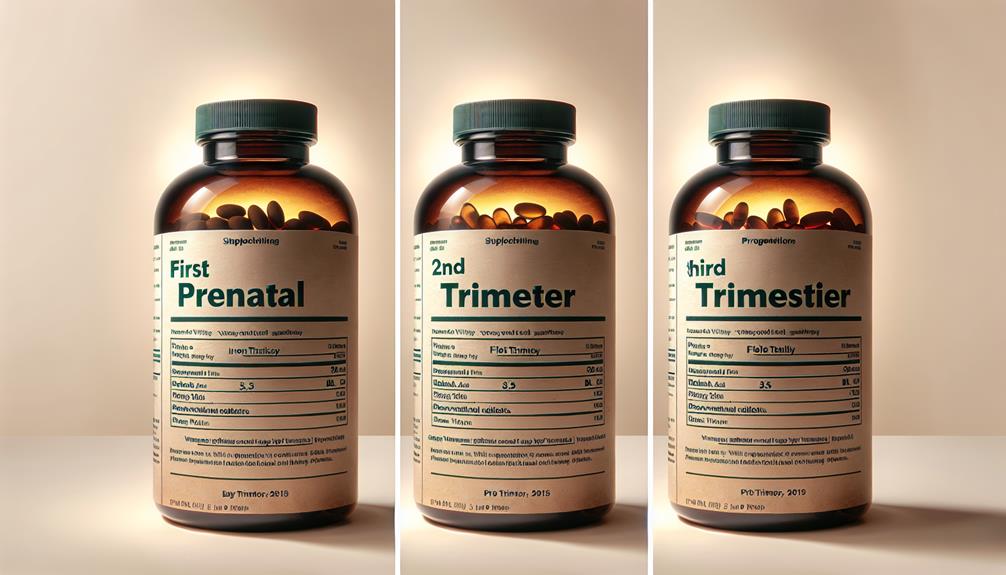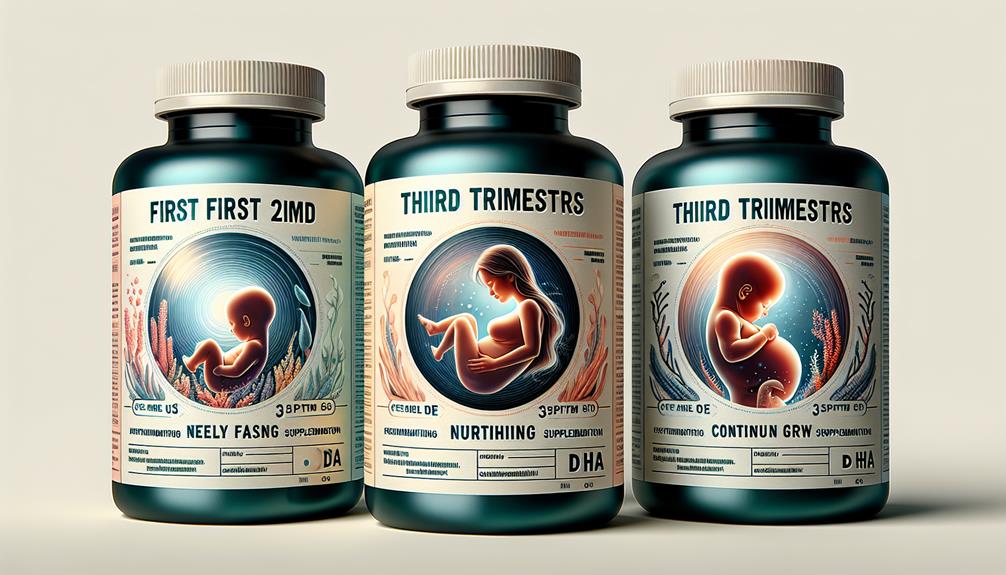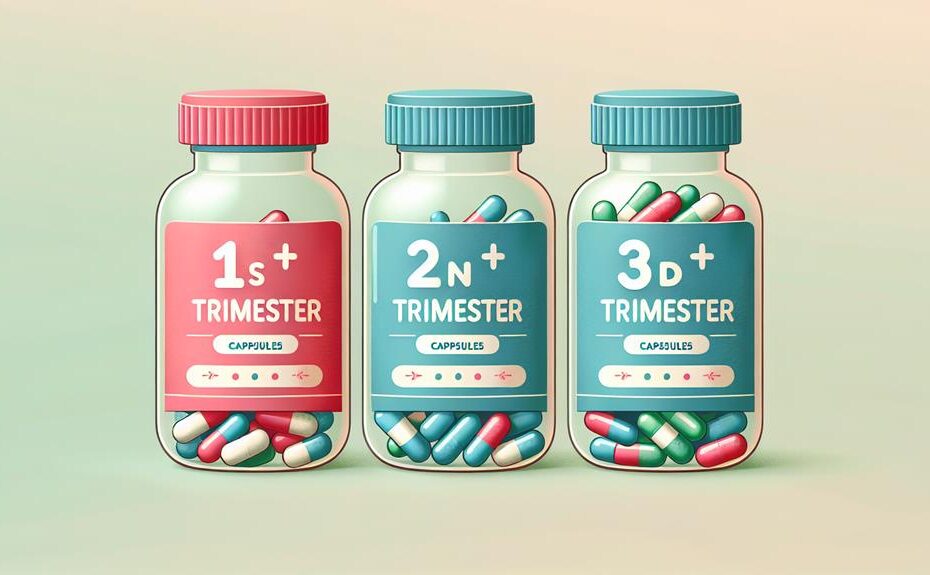







As you progress through pregnancy, prenatal vitamins adjust to meet changing needs. In the first trimester, focus on folic acid for neural tube development and iron for blood volume. Moving to the second trimester, include DHA for brain development, calcium, and vitamin D for bone health. By the third trimester, adjust dosages to suit evolving requirements, especially for iron, calcium, and vitamin D. Customizing prenatal vitamins throughout pregnancy ensures you meet specific nutritional needs for both you and your baby. Understanding these trimester-specific adjustments is vital for best maternal and fetal health.
Key Takeaways
- First trimester: Focus on folic acid for neural tube development and iron for blood volume.
- Second trimester: Include DHA, calcium, and vitamin D for baby's growth and bone health.
- Third trimester: Adjust dosages for iron, calcium, and vitamin D needs, consult healthcare provider.
- Tailor prenatal vitamins: Customize for specific trimester requirements.
- Key nutrients: Folic acid, iron, DHA, calcium, and vitamin D play crucial roles in each trimester.
Importance of Prenatal Vitamins
The importance of prenatal vitamins during pregnancy cannot be emphasized enough, as they play a crucial role in supporting the health and development of both the mother and the growing fetus. Pregnancy wellness is greatly influenced by the intake of prenatal vitamins, ensuring that both the mother and the fetus receive essential nutrients essential for their well-being. Maternal health is closely linked to the adequate consumption of prenatal vitamins, as they help prevent deficiencies that could lead to complications during pregnancy. These vitamins are specifically formulated to meet the increased nutritional needs of pregnant women, providing essential vitamins and minerals like folic acid, iron, calcium, and vitamin D. Ensuring that maternal health is optimized through proper nutrition is fundamental for a healthy pregnancy and the overall well-being of both the mother and the developing baby. Incorporating prenatal vitamins into your daily routine is a key aspect of maintaining a healthy pregnancy and supporting the best growth and development of your baby.
Nutritional Needs in First Trimester
Opt for a well-balanced diet rich in nutrients such as folic acid, iron, and calcium to meet the heightened nutritional demands of the first trimester of pregnancy. Early pregnancy nutrition is essential during this time as the embryo's neural tube develops, making folic acid necessary to prevent neural tube defects. Iron plays an important role in supporting the increased blood volume required for the placenta and fetal development. Additionally, calcium is necessary for the baby's bone formation, muscle function, and heart development.
Supplementation in the first trimester is critical, as many women may struggle to obtain adequate nutrients from diet alone. Prenatal vitamins formulated for this stage typically contain higher levels of folic acid to support early neural tube development. Iron supplements may also be recommended to prevent anemia and support the increased maternal blood supply. Calcium supplementation, although less common in prenatal vitamins, can be important for those who do not consume enough through their diet. Be sure to consult with your healthcare provider to determine the most suitable supplements for your individual needs during the first trimester.
Key Nutrients for Second Trimester

Consider incorporating additional sources of key nutrients like DHA, calcium, and vitamin D into your prenatal diet during the second trimester to support ideal fetal growth and development. Folic acid benefits cannot be overstated during this critical period, as it aids in preventing neural tube defects. Ensuring sufficient calcium intake is also vital for both you and your baby's bone health. Aim for around 1000 mg of calcium daily, which can be obtained from sources like dairy products, fortified plant-based milk, or leafy greens.
Additionally, meeting your protein requirements is essential for the growth and development of your baby. Include lean meats, poultry, fish, eggs, legumes, and nuts in your meals. Staying hydrated is equally important, as water supports the increased blood volume and amniotic fluid surrounding your baby. Aim for at least 8-10 cups of water daily, adjusting as needed based on your activity level and climate. By prioritizing these key nutrients and hydration, you can support a healthy pregnancy during the second trimester.
Adjusting Dosages in Third Trimester
Modify your prenatal vitamin dosages in the third trimester to guarantee the best support for both you and your baby's changing nutritional needs. During late pregnancy, supplementation needs adjustments to cater to increased nutrient requirements. Third trimester adjustments should focus on specific nutrient requirements like iron, calcium, and vitamin D. Iron is essential as blood volume increases, supporting both you and your baby's oxygen needs. Calcium aids in bone development and muscle function. Vitamin D plays a critical role in calcium absorption and bone health. Adjusting dosages ensures you meet these heightened demands. Consult your healthcare provider to determine the appropriate levels for your individual needs. Keeping up with these changes supports your well-being and contributes to your baby's healthy development. By making these adjustments, you optimize the effectiveness of your prenatal vitamins in the final stages of pregnancy.
Iron and Folic Acid Requirements

Adjusting your prenatal vitamin dosages in the third trimester is essential to meet the increased iron and folic acid requirements for best maternal and fetal health. During this stage, iron absorption becomes vital as it supports the expansion of maternal red blood cell mass and the transfer of oxygen to the growing fetus. Folic acid metabolism also plays a significant role in preventing neural tube defects and supporting rapid fetal growth. It is important to guarantee adequate intake of both nutrients to promote best health outcomes for you and your baby.
Nutrient interactions are significant to ponder when adjusting dosages. Iron absorption can be enhanced by consuming foods rich in vitamin C, while calcium-rich foods or supplements may hinder its absorption. Folic acid metabolism can be influenced by certain medications or conditions, requiring adjustments in intake levels. Consulting with your healthcare provider to determine the appropriate dosage adjustments tailored to your individual needs is recommended to support the demands of the third trimester effectively.
Vitamin D and Calcium Intake
Ensuring sufficient intake of Vitamin D and calcium is essential during pregnancy to support ideal maternal and fetal bone health. Adequate levels of Vitamin D are critical for calcium absorption, which is essential for bone development in both the mother and the growing fetus. Pregnancy nutrition guidelines recommend a daily intake of 600 IU of Vitamin D and 1000 mg of calcium for pregnant individuals. Vitamin D helps regulate calcium and phosphorus levels in the body, contributing to bone health and growth. Calcium, on the other hand, is necessary for bone mineralization and skeletal development. Insufficient intake of these nutrients during pregnancy can lead to an increased risk of bone-related issues for both the mother and the baby. It is important to include good dietary sources of Vitamin D and calcium or prenatal supplements to meet the recommended intake levels and support the best bone health throughout pregnancy.
Omega-3 Fatty Acids Benefits

Omega-3 fatty acids play an important role in supporting overall maternal and fetal health during pregnancy. These essential nutrients are critical for brain development in the fetus. Supplementing with Omega-3 fatty acids, specifically DHA (docosahexaenoic acid), has been associated with improved cognitive function and visual acuity in infants. During pregnancy, the demand for DHA increases as it is transferred to the developing baby to support neurological and visual development. Research suggests that adequate intake of Omega-3 fatty acids may also reduce the risk of preterm birth and support a healthy birth weight.
To make sure you're getting enough Omega-3 fatty acids, consider incorporating sources like fatty fish (such as salmon and mackerel) into your diet or taking a prenatal supplement that contains DHA. These nutrients are essential for pregnancy health and contribute to the overall well-being of both you and your baby. Prioritizing Omega-3 fatty acids in your diet or through supplements can provide numerous benefits for the development and growth of your little one.
Role of Vitamin B Complex
Exploring the impact of Vitamin B complex on maternal and fetal health can provide valuable insights into optimizing nutritional support during pregnancy. Vitamin B complex, which includes B1 (thiamine), B2 (riboflavin), B3 (niacin), B5 (pantothenic acid), B6 (pyridoxine), B7 (biotin), B9 (folic acid), and B12 (cobalamin), plays an essential role in energy metabolism. These vitamins are necessary for converting food into energy, thereby aiding in maintaining ideal energy levels during pregnancy. Additionally, Vitamin B complex is important for mood stability, as it helps regulate neurotransmitters in the brain.
Moreover, Vitamin B complex is critical for fetal development. It is particularly crucial for brain development and nerve function in the growing fetus. Adequate levels of these vitamins are essential to support the formation of the fetal nervous system and guarantee proper nerve signaling. Including Vitamin B complex in prenatal supplements can contribute to both maternal well-being and fetal health throughout the stages of pregnancy.
Importance of DHA Supplementation

Supplementing with DHA during pregnancy has been shown to play an essential role in supporting fetal brain development and cognitive function. DHA, an omega-3 fatty acid, is a vital component of the brain and retina, particularly during the third trimester when significant brain growth occurs. Studies suggest that maternal DHA intake positively impacts the child's cognitive function, attention span, and even visual acuity later in life.
Not only does DHA benefit the baby, but it also plays a role in maternal health and postpartum recovery. During pregnancy, the mother's DHA levels can become depleted as the fetus relies on the mother for its DHA needs. Supplementing with DHA can help replenish these stores and support the mother's overall well-being. Additionally, DHA has been linked to a reduced risk of postpartum depression, emphasizing its importance beyond pregnancy.
To ensure optimal brain development and cognitive function in your baby, consider incorporating DHA supplementation into your prenatal routine. Check with your healthcare provider to determine the appropriate dosage for your specific needs.
Tailoring Prenatal Vitamins
When customizing prenatal vitamins, consider tailoring the formulation to address specific nutritional needs during different stages of pregnancy. Dose adjustments play an important role in ensuring that pregnant individuals receive the appropriate amount of nutrients as their requirements change throughout the trimesters. For instance, during the first trimester, folic acid is essential for neural tube development, so higher doses may be recommended. In contrast, iron needs tend to increase in the second and third trimesters to support the growing blood volume and prevent anemia.
Nutrient combinations are another key aspect of tailoring prenatal vitamins. Ensuring the right balance of vitamins and minerals is essential for the health of both the pregnant person and the developing fetus. Calcium and vitamin D, for example, are critical for bone health and may need to be adjusted based on individual dietary intake and sunlight exposure. Additionally, incorporating omega-3 fatty acids like DHA can support fetal brain and eye development. By customizing prenatal vitamins with the appropriate dose adjustments and nutrient combinations, healthcare providers can better meet the evolving needs of pregnant individuals at each stage of pregnancy.






